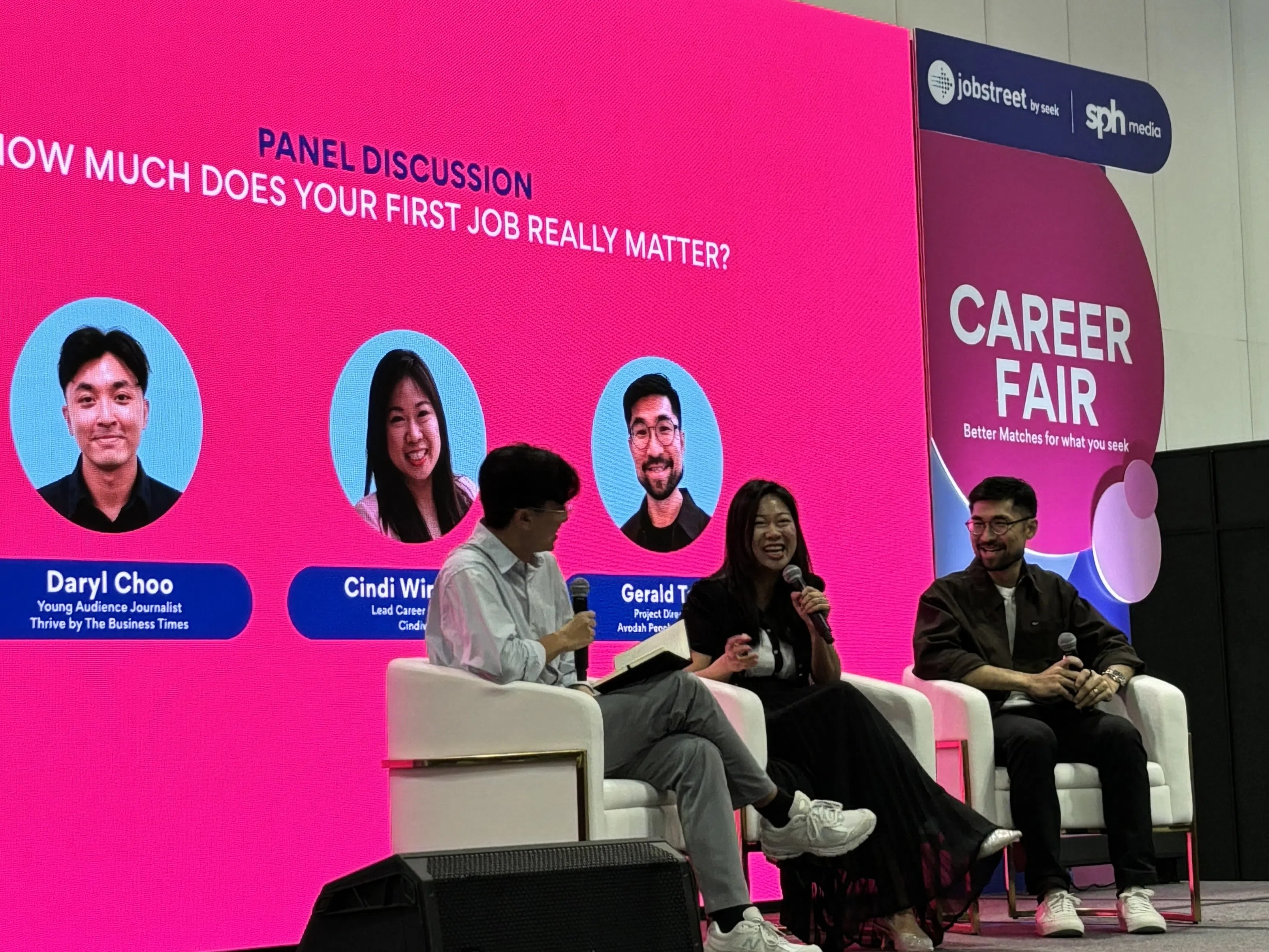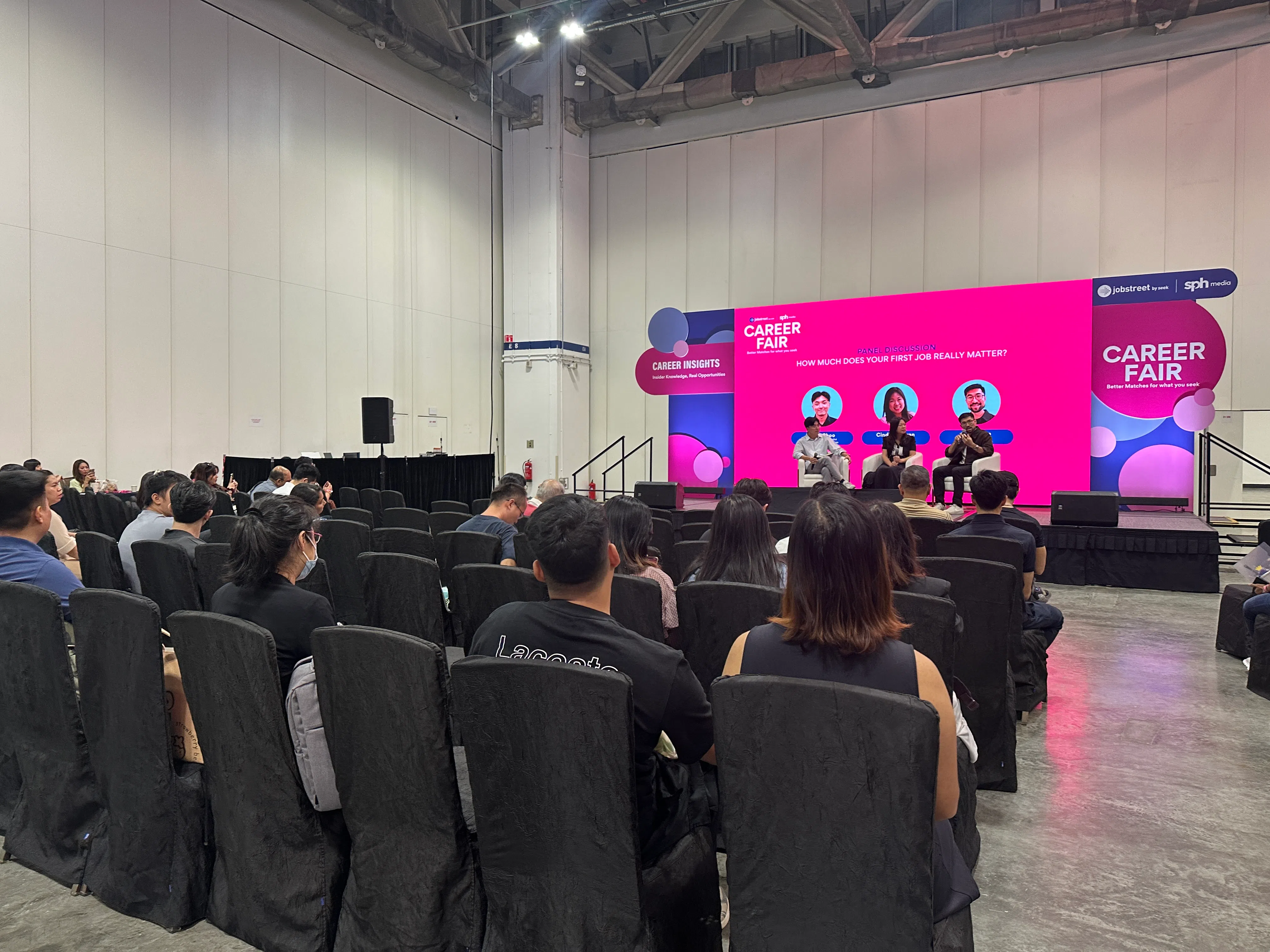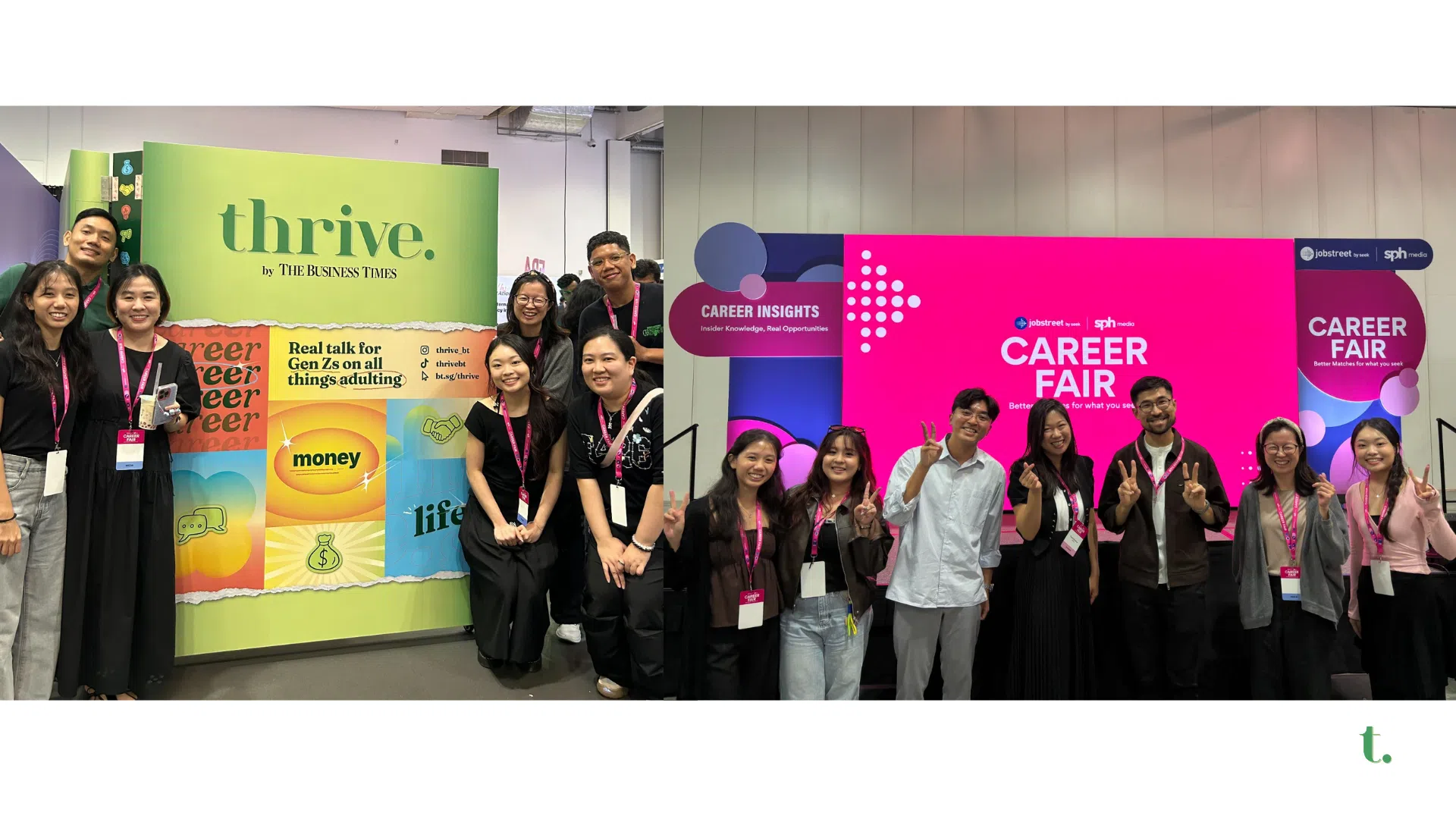Does your first job define your career?

Straight to your inbox. Money, career and life hacks to help young adults stay ahead.
[SINGAPORE] At a panel discussion on Aug 30, thrive picked the brains of two career coaches who shared candid truths about first careers.
The two panellists were:
- Cindi Wirawan, lead career coach at Cindiw
- Gerald Tan, projects director at Avodah People Solutions
This was one of the career insight dialogues at the Career Fair by Jobstreet by Seek and SPH Media held at the Marina Bay Sands Expo and Convention Centre.
Here are edited excerpts from the panel discussion and question-and-answer session.
💼 How much does your first job really matter?
Wirawan: Fresh graduates often fear that by making the wrong choice, they’ll be stuck in that role for the rest of their lives.
Navigate Asia in
a new global order
Get the insights delivered to your inbox.
While your first job is quite important, it doesn’t determine the rest of your career.
That said, it’s a stepping stone. It’s where you’ll learn a lot about yourself.
Tan: We tend to fixate on finding the best job. But what’s more important is: Are we in the right place?
For a young person, it’s important to find a nurturing work environment – one where you’re allowed to make mistakes and grow.
You want to be in a place where you can learn and not just be expected to perform from day one.
I think having a good supervisor at your first job is also really important. After all, people don’t leave jobs, they leave bad bosses.
Then again, it also depends on what you make of your experience as well.

💰Does your first pay set the benchmark for what you’ll earn in the next few years? Wirawan: Your first salary doesn’t always set the stage for the rest of your career.
If you remain in the same role or function, your first salary does set the base. However, if you pivot to a different industry, it may not set the benchmark for your next job.
Case in point, when I left the recruitment industry to become a career coach, I actually took a huge pay cut and accepted a S$20-per-hour job.
Tan: It should not matter.
The salary you earn should be benchmarked against your current job responsibilities, not against what you last drew.
I think all of us want more salary, right? That’s normal human behaviour.
But there is also a threshold – a point where it’s too much.
Employers want to hire talent at a certain price point, and if your expected salary rises too fast, you may risk being seen as an expensive hire.
Salary increments should be in tandem with our experiences. If you don’t have enough experience to back your expected salary, you may not be able to justify your next pay hike.
But the reality is, most companies will still request your last payslip, then mark up or accept negotiations from there.
💸 If a company asks me for my last salary, how can I say no without affecting my chances of getting a higher pay? Tan: The textbook answer is to hold off for as much as possible.
But I also think it’s fair to share how much you last earned, then inform them of your new expected salary. Show that you’ve done your research and have enough to justify your expected amount.
If you’ve been pushed to a corner, you can provide a salary range instead of sharing the exact number you last earned.
Wirawan: You could offer to disclose it only at the offer phase.
I would redirect the conversation back to the role and say: “I’m happy to share more at the offer stage. But at this point, I would love to focus on how this role would be the best fit for me.”

📝 If a “branded” company offers low pay, should a fresh grad still take it up to boost their resume? Wirawan: What’s important is: Does taking a huge pay cut justify the opportunity cost?
If you can afford the lower pay and the branded company provides you with the best mentors, skills and exposure, then take it.
Tan: Weighing the costs is important because after a while, the bread-and-butter issues of having a very low salary will hit you.
So, balancing the trade-offs is important.
But if your goal is to learn, then make sure that you achieve what you set out to accomplish in that company. Then, make plans for your next step.
Give yourself space to grow and achieve it. Don’t settle.
🏢 Do employers value fresh grads with experience at a branded MNC? Wirawan: From a recruiter’s perspective, sometimes a company’s name does matter.
On occasion, when recruiters look for candidates on LinkedIn, it’s easier to pick out those who have worked at the big names.
In a way, these candidates have already been pre-vetted by those reputable companies. So, they must be of a certain calibre to have secured a job there.
It’s like a “lazy way” for recruiters to find candidates. But that’s also not the fairest, as there are brilliant talents even at lesser, unknown companies.
While corporation names may matter, it’s important to build your own personal brand and not just depend on the names of the companies you’ve worked for.
Tan: I totally agree that brand names send a signal. But getting into the interview room is only the first step.
Next is securing the job, and what sells you is your experience. At the end of the day, you’ll still need to showcase what you’ve done at those companies.
But remember, coming from a branded company also means your future employers will have higher expectations of you.

🏃 Is it okay to leave a company after four months if you think you aren’t growing?
Wirawan: Sometimes, Gen Zs want instant gratification – especially in their first job.
But you’re not going to magically grow within the first two months. Growth takes time and patience.
You also need to earn the trust of your employer before you’re handed bigger responsibilities.
I always tell my clients to secure a job before resigning – unless the current role affects their mental or physical health.
Tan: I would say you need at least nine months to figure out whether your workplace is right for you.
During the first three to four months, you’ll probably encounter challenges because you’ve yet to adjust to your new environment. So, give yourself some time to adapt.
I think these days we quickly fall into assumptions that things are bad. When situations get just a bit tougher, we assume that it’s toxic.
When that happens, counter-check with others and seek external perspectives. In doing so, you will get a better gauge of the severity of your situation.
But if it affects your mental health, you should always prioritise that first.
💡What’s one thing someone in their 20s should know before starting their first job? Tan: Go in with a sense of curiosity.
Don’t expect certainty and don’t expect to know everything.
Employers actually cut fresh grads a lot of slack. So, allow yourself to grow and don’t limit yourself to concrete choices.
Life is long, and you’ll have many junctures to adjust along the way.
Wirawan: You need to gather three things from your first job: KNS – (note: not what you think it is!) knowledge, network and skills.
Every job prepares you for the next. So, even if you think your current job isn’t the best fit, make sure you make the most of it and get as much KNS as you can.

TL;DR
- Your first job is a stepping stone, but it won’t set the course for the rest of your career
- First salaries may not always set the benchmark, but make sure you’re able to justify your next pay hike
- Having reputable companies on your resume may help, but these big names only get you so far
- Ultimately, what truly matters is how you make the most of each professional experience
Decoding Asia newsletter: your guide to navigating Asia in a new global order. Sign up here to get Decoding Asia newsletter. Delivered to your inbox. Free.
Copyright SPH Media. All rights reserved.


